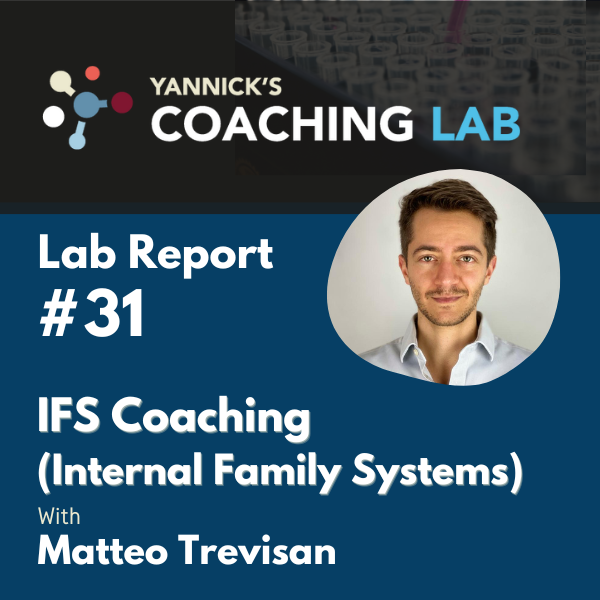
Curious to know what this session was like? Have a peek at the Lab Report below or consider VIP membership to access the full recording of this and many more exciting sessions.
Yannick’s Coaching Lab #31 — Matteo Trevisan
Lab Report by Daniel Lev Shkolnik
Summary
Matteo Trevisan is the Director of Professional Development for the ICF, has trained over 1300 coaches as part of Animas Centre for Coaching and other organizations. He has an eclectic set of coaching skills and can work in many different modalities. During the Lab, Matteo felt that Internal Family Systems (IFS) sometimes known as “parts work” was the most appropriate way to work with his client who presented with procrastination. This resulted in a deep and powerful session that exhibited the power of IFS.
Key Insights
Coaching Frame, Therapeutic Process
IFS is a therapeutic process, but Matteo used it in a coaching frame. He entered into the session resourcefully, having studied and worked with IFS on his own and then completing an accreditation program. He was able to work from a place of expertise and confidence in the IFS landscape, and kept full control of the process even when difficult material emerged.
Going Inside
Early in the session, Matteo had his client close their eyes and go inside themselves. This shifted the client from a “thinking” state to a feeling state. When the client opened her eyes on several occasions to relay what she was experiencing, Matteo encouraged her to keep them closed and stay with her inner experience. This allowed the client to delve deep into the underlying emotions driving her fear and shame around procrastination.
Feeling the Body
To help his client get in touch with the emotion of fear which underlay her procrastination, he asked her to tune in to how it appears in her body; both where it resides and what it feels like. This technique brought the client into contact with these feelings so she could work with it more directly.
Protectors & Exiles
Internal Family Systems defines two major kinds of inner “parts:” protectors and exiles. Matteo briefly introduced these and how they function. He primarily worked with one of the client’s protectors: her fear. By facilitating an inner dialogue between the client and this protector, she was able to recognize the way her procrastination was an attempt to prevent burnout and illness from overwork.
“How old does this part think you are?”
Matteo said this question sparked his fascination with IFS. He read it in an IFS book and was perplexed—how could a part of you not know your true age? Yet, when an IFS practitioner asked him that exact question in a session he was surprised: a number immediately popped into his head—and it was not his real age. This demonstrates the way in which our inner parts can—paradoxically—be unaware of the rest of our being, and may be stuck in old defensive patterns or holding onto beliefs that no longer serve us today.
Be Kind to Your Parts
Matteo demonstrated the utmost respect for his client’s inner parts, and asked her to do the same. “Thank this part for…” “Invite this part forward.” “Ask this part if it would be willing to sit in the audience.” He guided his client to relate to her inner parts with great kindness and gentleness. This seemed to allow the client’s protective parts (responsible for her fear and shame) to relax and step aside so that she could arrive to a clear experience of centeredness where she could achieve insights about the real issues underlying her procrastination.
The Core
When the client felt that all the parts were respectfully sitting in the “audience” and observing, she experienced a deep calm. “Everyone has stepped back and I am just here. All these little “me’s” are all in the background, not in the spotlight.” After the session, Matteo described this as “the part that’s not a part.” This center is called “the core” in IFS, the Self with a capital “S”, and Matteo compared it to the calm, clear core of being referred to in Buddhism. According to IFS theory, when the core is uncovered we feel spontaneously calm, confident, curios centered, creative, playful, adventurous, and stable. The core needs no improvement and is perfect as it is.
Watch the recording of this session by joining the Lab as a member: www.GoCoachingLab.com
A list of all available recordings can be found at https://bit.ly/LabRecordings
This Lab Report was authored by Daniel Lev Shkolnik

